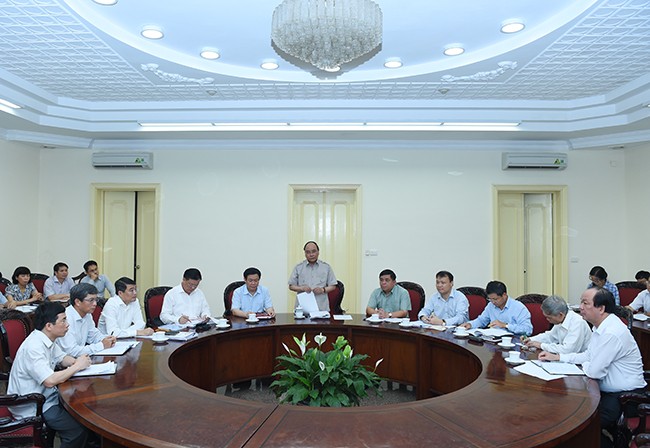(VOVworld)- The consumer price index (CPI) in May rose 2.28 %, the biggest increase in 5 years. Prices of 11 groups of commodity were higher than in the previous month. In the face of greater inflation pressure, the Vietnamese government is determined to curb inflation rate to below 5%.
 |
| Prime Minister Nguyen Xuan Phuc called for efforts to control inflation (Photo: VNA) |
The CPI in the first 5 months of this year rose 1.88% against last December. Last year, CPI was low because of an oil price plunge, prices of public services remained stable and monetary policy was tightened. This year, world oil prices appear to be rising after reaching the bottom, and drought and saltwater intrusion may push up the prices of agricultural produce. According to local reports, the CPI is likely to rise as prices of public services rise. Dr. Nguyen Duc Thanh, Director of the Institute for Economic and Policy Research, said: “Technically, the CPI increase hovering around 4 or 5% is not high. But it matters that we don’t know what will happen next year. Last year, the CPI rose 1%, this year 5% and will it be 10% next year? If inflation is too high, it may cause instability”.
Deputy Prime Minister Vuong Dinh Hue called for quicker and more accurate forecasts and closer cooperation between ministries and financial and monetary policies. He asked for the issuance of price management data. The Ministry of Trade and Industry is required to amend decisions on average retail price of electricity and its price list. The Ministry of Finance needs to supplement the government’s decree on the Price Law. The Ministry of Health should finalize documents interpreting Bidding Law and the decree on medicine bidding. The Ministry of Construction is required to promptly issue a decree on the development and management of social housing. The Ministry of Information and Communications is set to complete a document on the management of telecommunications fees and public services.
Deputy Prime Minister Vuong Dinh Hue urged the Ministry of Trade and Industry and the Ministry of Finance to work out a roadmap for petroleum price adjustments and project its effects on the CPI. Vu Thi Thu Thuy, Head of the Department of Price Statistics of the General Statistics Office, said: “The government, including the Ministry of Finance and the Ministry of Trade and Industry, needs to closely watch price developments in the market, particularly prices of necessities like rice, petroleum, steel, and fertilizer. Market monitoring should be strengthened. The timing of price increases should be taken into consideration to avoid ripple effects”.
Hopefully, the government’s efforts to curb inflation will help stabilize the macro economy.